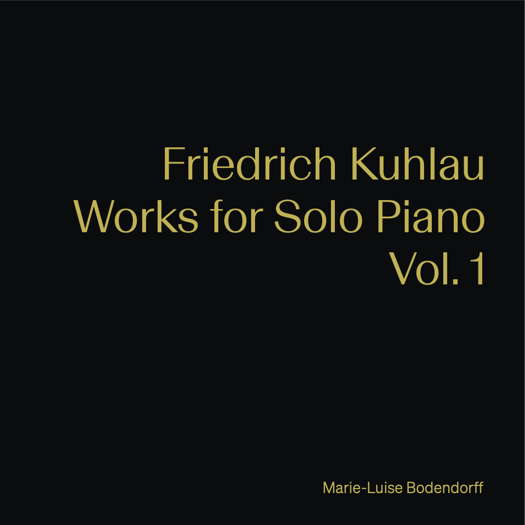- military band music
- Passamezzo
- James Redwood
- World War One
- Robert Anderson
- Grażyna Bacewicz Biernacka
- Joe Howson
- Pablo Ferrandez
 DISCUSSION: What is a work? John Dante Prevedini leads a discussion about The performing artist as co-creator, including contributions from Halida Dinova, Yekaterina Lebedeva, Béla Hartmann, David Arditti and Stephen Francis Vasta.
DISCUSSION: What is a work? John Dante Prevedini leads a discussion about The performing artist as co-creator, including contributions from Halida Dinova, Yekaterina Lebedeva, Béla Hartmann, David Arditti and Stephen Francis Vasta.
 WORD SEARCH: Can you solve Allan Rae's classical music word search puzzles? We're currently publishing one per month.
WORD SEARCH: Can you solve Allan Rae's classical music word search puzzles? We're currently publishing one per month.

Dramatic Potency and Marvellous Clarity
GERALD FENECH listens to piano music by German-born Danish composer Friedrich Kuhlau
'Marie-Luise Bodendorff is an inspired and enthusiastic interpreter of this rare but lovely repertoire ...'
Friedrich Kuhlau was born on 11 September 1786, the same year as Weber, in the Uelzen district of Lower Saxony. At the age of seven he fell down a staircase and a shard of glass from a bottle he was carrying injured the young boy in the right eye, which he eventually lost. During his convalescence Kuhlau's bandmaster father bought his son a piano, sealing the young man's relationship with the instrument that would come, as much as the flute, to define his career as a composer and pianist.
Although he came from a poor family, his parents managed to pay for piano lessons. In 1802 he moved to Hamburg where he started to study the instrument in earnest. Two years later he made his debut as a concert pianist, and it was around this time that he began to compose songs and chamber music to earn a living. In 1810 he fled to Copenhagen to avoid conscription in the Napoleonic Army. In 1813 Kuhlau eventually became a Danish citizen. Despite the fact that his talents as a composer were all too evident his works failed to gain any proper recognition.
In 1821 and 1825 Kuhlau travelled to Vienna where he met Beethoven. Soon the two became good friends, and the master's influence is very evident in Kuhlau's later works, such as his most famous piece, the 'singspiel' Elves Hill. Indeed, it was the same Kuhlau who premiered all five piano concertos of his esteemed friend in Denmark. It was as a pianist that Kuhlau was best known in his lifetime. In that capacity he would travel to Sweden and Austria, as well as returning to his native Germany.
Back in Copenhagen, life's stresses caught up with him. He lost both parents in 1830 and in February 1831 his house burned down to the ground, and all his unpublished manuscripts were destroyed. He died on 12 March 1832 from a chest ailment, aged only forty-five.
Kuhlau's music has all the hallmarks of early Romanticism, and his piano music can be divided into works intended for teaching or improving the technique of talented amateurs, and grand works for the virtuosi of the instrument. The Divertissement, Op 37, which was published in 1822, is a through-composed piece with the first and last movements acting as an introduction and coda respectively. With a variation-form second movement, a stirring March and a rousing 'Polonaise' as the third and fourth, this piece is a prime example of the composer's facile gift to write fluent and yet truly melodious music.
Listen — Friedrich Kuhlau: Rondo alla polacca (Divertissement in E flat)
(track 4, 0:00-0:48) ℗ 2021 Dacapo Records :
The three Sonatinas, Op 20, date from 1820 and were probably intended for teaching purposes. No 1 in C is built simply but has its own luminous charm and symmetrical satisfaction. No 2 in G is more dramatic and elaborate, with a central Adagio, that is both lyrical and decorative, cast in close-quartered harmonies.
Listen — Friedrich Kuhlau: Adagio e sostenuto (Sonatina Op 20 No 2)
(track 10, 0:47-1:26) ℗ 2021 Dacapo Records :
No 3 in F is even more complex, its opening Allegro con spirito requiring the soloist to cross hands.
Listen — Friedrich Kuhlau: Allegro con spirito (Sonatina Op 20 No 3)
(track 12, 1:27-2:23) ℗ 2021 Dacapo Records :
This piece ends with a 'Polonaise', Kuhlau's favourite dance.
During his career Kuhlau composed twenty-two piano sonatas between 1809 and 1831. His first in E Flat, Op 4, was written before the composer left Germany. The work of a young man, it sometimes borrows innovative ideas from others, but the dramatic potency and marvellous clarity of the music here are rarely in doubt.
Listen — Friedrich Kuhlau: Vivacissimo (Sonata in E flat, Op 4)
(track 19, 4:03-5:01) ℗ 2021 Dacapo Records :
Marie-Luise Bodendorff is an inspired and enthusiastic interpreter of this rare but lovely repertoire, and her flowing virtuosity brings out all the sparkle encased in these simple yet charming miniatures. A truly auspicious start to a cycle which promises to be an exciting voyage of discovery of a composer still waiting for true recognition. Notes and sound are first-rate.
Copyright © 18 May 2021
Gerald Fenech,
Gzira, Malta

CD INFORMATION - FRIEDRICH KUHLAU: WORKS FOR SOLO PIANO VOL 1


